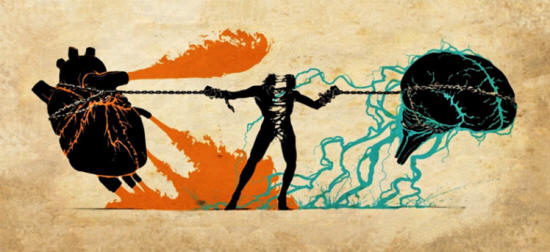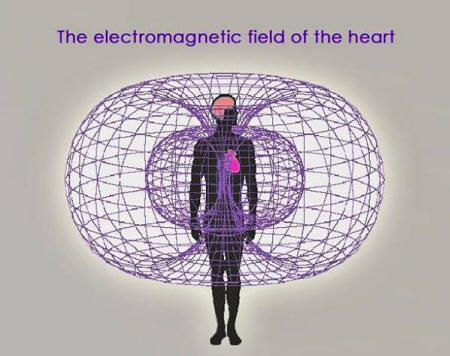|
|
|
In modern day society, especially in the Western
world, if you were to ask someone to point to the place in their
body where their consciousness is located and their decisions are
made, they would most likely point to their head.
They understood the heart's ability to intelligently
perceive and decipher the world around them, and acknowledged the
limitations and reductionist nature of living in a manner in which
one relies primarily on the mind.
The ancient Greeks referred to this kind of silent, invisible heart-based communication as aesthesis, which means "to breathe in."
Due to this, the heart is sometimes referred to as the "heart brain" and our minds are referred to as the "cranial brain."
Neural signals sent to the cranial brain from the
heart significantly impact brain function and affect emotional and
cognitive processes such as attention, perception, memory, and
problem solving.
For example, the erratic, unstable patterns of heart activity experienced when stress and/or negative feelings are present, send corresponding neural signals from the heart to the cranial brain that inhibit cognitive faculties.
As a result, the ability to reason and think clearly is impaired, which may be the reason why many act impulsively and make poor decisions in stressful situations.
On the other hand, the stable, orderly patterns of heart activity during pleasant situations and in the presence of positive feelings result in corresponding neural signals sent from the heart to the brain which improve cognitive functions and encourage mental stability.
So, making an effort to manifest a life that evokes positive feelings can greatly increase cognitive abilities and emotional stability.
Researchers refer to this phenomenon as a "body premonition."
This further encourages the notion that implementing the heart as an organ of perception may be far wiser than isolating the brain as the primary center of perception and consciousness.
The Heart and Energy Fields
The heart, which holds the title as the organ with the most powerful electromagnetic field in the body, can sense the heart of another individual up to ten feet away.
Since the brain is highly sensitive to the reactions
of the heart, it is able to pick up this kind of electromagnetic
"heart sensing" and essentially alter the brain waves of another
individual, as well as themselves, and/or actually synchronize their
brainwaves with the other person's.
Most of us have met a person whose presence, for no apparent reason, caused a sense of discomfort - whether it was sadness, anger, anxiety, or any other uneasy feeling - that warranted the decision to not forge a deeper connection with them.
Just as we may not know why we felt this way around them, as they said all the right words and presented themselves in a "socially acceptable" way, we often may not pick up on the fact that this is occurring because of the other person's energy and it is, in reality, not personal at all.
In this way, the electromagnetism of the heart
greatly shapes our relationships, guiding us by what seems to be an
almost effortless gravitation to connect with the heart fields of
some people who then become friends and/or romantic partners, and
steering us away from people whose heart energies clash with our
own.
For example, when you go to a restaurant and the hostess tells you that you can sit wherever you would like, you most likely do not choose just any given table. You are far more likely to observe the room, checking out various seating options, even if your consideration of each is fleeting.
Then you choose one table, oftentimes out of numerous other identical ones, but why?
Sure, there are factors like noise and wanting to sit by a window - but not always.
I think each of us can admit to at least once in life choosing to sit somewhere because we were drawn to it, or to not sit somewhere because for whatever reason it doesn't "feel" as good as somewhere else in the room.
Rarely do we stop to wonder why we intuitively make decisions like this.
They tell you it will lead you into trouble, but that very way of living, of placing consciousness solely in the mind and designating it as the only intelligent organ of perception in our bodies, is perhaps why such people are so pessimistic in the first place.
To place thoughts over feelings when making big decisions in life, especially big decisions, can be dangerous - not in the way society defines danger, but by the way the spirit defines danger, as confining any part of your true essence within, which is in many ways a waking death.
Debatably equally dangerous though, and certainly equally important, is to not place feelings over thoughts entirely when making decisions either. Yes, especially big decisions.
The trick to solving this problem truly isn't much of
a trick, rather it's more of an ancient, long forgotten way of
living in which you maintain somewhat of an energetic equilibrium
between the heart and the brain - and all parts of oneself for
that matter.
Making a mental effort to silence thoughts and listen to your feelings, and to notice how feelings alter when the people or things surrounding you are altered, allows cranial consciousness and heart consciousness to work productively together without one dominating the other.
Playing with how different thoughts make you feel, without then attaching more thoughts to those feelings or stories to them, and instead just letting them sit there while you consciously acknowledge they are there, is also crucial for finding a balance in working with both organs of perception.
By listening to how the heart feels without adding mental thoughts and stories to those feelings, you can then choose to place your thoughts towards what feels more right to you when making decisions.
|




